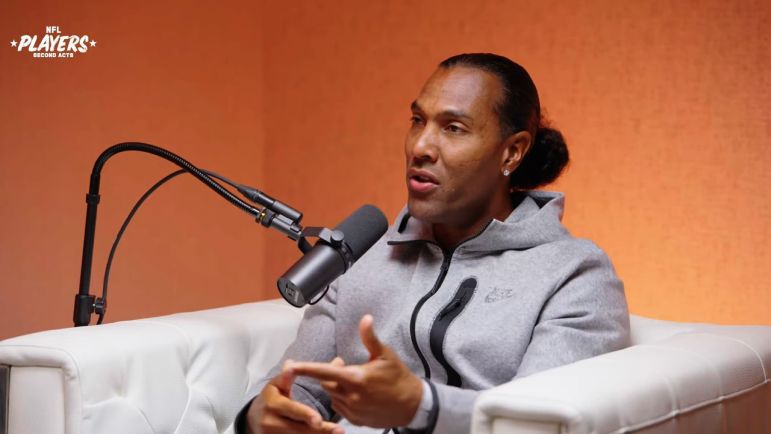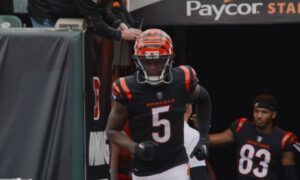How does a Cincinnati Bengals team with real talent, T.J. Houshmandzadeh and Chad Johnson at wide receiver, Rudi Johnson at running back, and Carson Palmer at quarterback, so consistently underachieve? A terrible culture is how. That’s essentially what Houshmandzadeh blamed the Bengals’ lack of success during his era on, outlining the reasons in a recent interview.
“You really delve into the ‘Why weren’t we good?'” Houshmandzadeh said on the NFL Players Second Acts podcast. “It’s the off the field. It’s the lack of discipline. It’s the complete lack of respect and structure of the guys on the team…We did what we wanted to do. When I first got to Cincinnati, we didn’t even stay in hotels for home games.”
Though it might sound strange on the surface, teams even rent out hotels the night before home games to have the entire roster together. That avoids anyone being late or doing anything reckless the night before the game. In Cincinnati, players just chilled at home and showed up to the stadium whenever they wanted.
But away games brought even more shocking stories. Houshmandzadeh explained that one day a starter failed to even make it to the airport.
“I don’t drink. But Saturday night for home games, dudes would do whatever they wanted to do,” he said, “I remember vividly, I’m not going to say this guy’s name, you meet up Saturday at the stadium to get ready to fly out. We’ve got a starter on our team that wasn’t there…I was friends with him, the bus went to his house.
“I go to his house, he was sleep. We’re on our way to the airport to go fly out and play. Walked in there, woke him up. ‘Hey bro, what you doing?’ He was like, “Oh, shit.’ Got up, didn’t even put his clothes on. Took a shower.”
Not only did the player oversleep, but he also showed no urgency in getting on the bus to rush to the airport. Houshmandzadeh later said the coaches didn’t punish him for not showing up, and he started the following game.
Drafted by the Bengals in 2001, Houshmandzadeh played for the franchise through the 2008 season. Over that span, Cincinnati had just one winning season and one playoff berth. That came in 2005, famously losing to the Steelers in the Wild Card round after Carson Palmer tore his ACL on a low tackle by DL Kimo Von Oelhoffen.
Still, the Bengals were a team with enough core pieces in place to be more successful. Houshmandzadeh was a great Robin to Johnson’s Batman. In 2006, Johnson led the NFL in receiving yards. In 2007, Houshmandzadeh led the NFL in catches. In 2005, Palmer led the league in touchdown passes. In the backfield, the team boasted Corey Dillon and Rudi Johnson throughout the decade. Johnson might be one of the most underrated runners of the last 25 years, rushing for over 1,300 yards in three straight seasons from 2004-2006.
But because the Bengals had no organizational structure, discipline, or culture, they were a house of cards—a group that crumbled at the first sign of trouble. Compared to the steady and strong Baltimore Ravens and Pittsburgh Steelers, the Bengals couldn’t compete.
Houshmandzadeh noted that in 2003, Marvin Lewis began to change the culture, but it was an uphill battle. His comments also suggest Dick LeBeau, the Bengals head coach in 2001 and 2002, struggled to build the team up and created that instability. After spending a year in Buffalo, LeBeau was fired after the 2002 season and was brought back to Pittsburgh as the Steelers’ defensive coordinator in 2005.
Those issues persisted under Lewis. While the Bengals stabilized, they were undisciplined and made reckless mistakes. Vontaze Burfict was a dirty player, he and the team choking away a playoff win against the Steelers in a 2015 Wild Card Game.
Under new head coach Zac Taylor and the underrated Duke Tobin, the Bengals have become a strong organization. They’ve posted winning records the last three years, finishing 2023 9-8 despite losing QB Joe Burrow for the last seven games. In 2021, they went to the Super Bowl, and in 2022, they made it to the AFC Championship Game. They figure to compete again for the division and conference crown in 2024, a team with a different feel and culture than Houshmandzadeh had decades ago.








